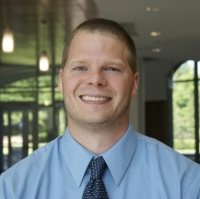Leading Care: Dr. Matt McCoy and the Pennsylvania Association of Nurse Anesthetists
In this interview, Matthew McCoy '05 MSN, '13 DNP, CRNA reflects on his leadership in advancing nursing through service in a professional organization.
He is associate director, Post-Baccalaureate Nurse Anesthesia Doctor of Nursing Practice Track; and vice president, Pennsylvania Association of Nurse Anesthetists.

How did you rise to this leadership position? I was nominated to run and was elected by the PANA membership.
Who influenced you? Too many to list but those that have been influential in my professional development include Bette Wildgust CRNA, Jodie Szlachta CRNA, Maria Van Pelt CRNA, Melinda Brown CRNA.
Why is it important to you? It is important for me to not only belong to our state organization but to be active in the mission. It is easy to forget how import “community” is until you encounter an obstacle insurmountable as an individual.
Why are you enthusiastic about your work in this role? I sincerely believe that the state organizations work is imperative to our professional growth as individual CRNAs. I am allotted a very comfortable living for my clinical work and PANA works hard to ensure this remains sustainable for all CRNA’s in Pennsylvania.
What are the issues you deal with and what’s the biggest challenge in your area? We have many challenges/obstacles including, but not limited to resistant/difficult legislators and a very powerful opponent organization, the Pennsylvania Society of Anesthesiologists (PSA). We are currently one of only 2 states that does not officially recognize CRNA’s with title protection or advanced title designation. That, along with scope of practice, have been some of our largest hurdles to date.
How are you effective in your role? What’s critical to your success in the role? Listening, understanding, and communicating are critical to my leadership role.
How does innovation fit into your role as leader? PANA is constantly striving to find new methods and ideas to communicate with our state or legislative members.
Is there anything you wish you’d done differently on your rise to this position or while in it? No. I continue to adjust my approach to not only this leadership role but my professional development as well.
What’s your advice to someone who wants to be a leader in their area of interest? Find a mentor and observe how he or she interacts.
What is your leadership philosophy? As a DNP graduate of Villanova I also strive to be a “transformational” leader. However, as an elected member to the board, we tend to be servant leaders where the needs of the membership comes before our own.
What’s your hope for our profession? That we continue to meet the demands of the modern health system while practicing to our full potential where barriers to scope of practice have been removed.
